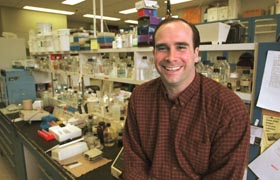
| ||
 | ||
 Andrew Cuddihy PHOTO: OWEN EGAN |
To the top in silence
|
DANIEL McCABE | Andrew Cuddihy isn't like most other students who are graduating. For one thing, when his name was called out at Place des Arts on Tuesday to receive his degree, Cuddihy didn't hear a thing.
He is deaf. That hasn't stood in the way of his receiving an excellent education at some of the best universities in the country, though, culminating in his PhD from McGill's Division of Experimental Medicine. Cuddihy, who is able to speak, lost almost all of his hearing at the age of four as a result of meningitis. "Initially I thought I had lost my voice instead of my hearing," he recalls. "When I eventually realized I had lost my hearing, according to my parents, I was pretty philosophical about it." He credits the Montreal Oral School for the Deaf (MOSD) for helping him to learn how to cope with his disability and for assisting him in integrating into a regular classroom setting with hearing children. He also praises the efforts of his parents, Nora and Basil. "They took a very hands-on approach to my education, working with me for hours on end after school to ensure that I understood thoroughly what I was learning in the classroom. "The role of the parents in their children's education, especially when that child has a disability, cannot be undervalued. I know of several former MOSD students who have achieved academic successes and the one common thing that pervades is the role of their parents," states Cuddihy, responding to a series of e-mailed questions from the Reporter. School didn't exactly come easily to Cuddihy. Although he describes himself as an excellent lip reader, following complex lectures proved to be difficult, particularly at the university level. For his first few years at university, Cuddihy says he "tried to hack it on my own by going to class and trying to take what notes I could and then going home and trying to supplement my meagre notes with stuff from the textbook." But this method wasn't satisfying -- there were too many gaps -- so Cuddihy started using the services of a note-taker. It was an improvement, but it still wasn't ideal. Note-takers write things down in a fashion that can't help but be tailored to their own learning styles;points will be jotted in a style designed to jog their own memories about what the professor said in class. If Cuddihy didn't hear those points in the first place, they wouldn't be in his memory to jog. He also found he couldn't rely on textbooks as much, as his studies progressed, since classroom discussions became much more integral to his upper-level courses. Together with some friends at Queen's (where he did his undergraduate work), Cuddihy designed a computer program to address his situation. Called "C-Note," the program uses a modem to connect a pair of lap-tops in a classroom -- one is used by a deaf student, the other by a note-taker. The typist transcribes in real time what the professor is saying and the transcript appears on both computers simultaneously. Cuddihy says such a set-up enables a student with a hearing disability to follow the class much more closely -- if he sees laughter suddenly breaking out, he'll know why by reading the evolving transcript. C-Note also frees up deaf students to take down their own notes from professors' instructions or comments on blackboards or overhead projectors. The laptop has a split screen, so students can take down their own notes on one side, while following the transcription on the other. Reading the transcription as it's typed in also allows deaf students to participate more fully in classroom discussions. Using C-Note, Cuddihy says he was able to pose questions "without worrying that the question sounds stupid and/or has already been addressed." According to Cuddihy, C-Note "is being used extensively by several universities all over North America and Europe," among them, McGill's own Office for Students with Disabilities. Cuddihy's research supervisor at McGill was oncology professor Dr. Antonis Koromilas. "He is an excellent student," Koromilas says of Cuddihy, pointing out that two papers that the pair co-authored have been published recently in research journals. He adds that Cuddihy made the dean's honour list for top-performing students. The major challenge in their relationship was Koromilas's accent; Cuddihy initially had problems lip-reading his supervisor. But the pair soon worked it out; Koromilas would write down his key points, while Cuddihy got the hang of deciphering what Koromilas was saying. Koromilas gives his student top marks for determination. He says Cuddihy's research topic covered largely virgin territory and that the PhD student "started from scratch and generated a lot of data" for his thesis. "I have been extremely fortunate in that my professors and fellow students have been overwhelmingly positive in terms of their response to my situation. They have accepted me as one of their peers and I've had no problems," says Cuddihy. He adds that the Office for Students with Disabilities "is doing an excellent job." Next up for Cuddihy is Australia, where he plans to pursue cancer research as a postdoctoral fellow at the Peter MacCallum Cancer Institute in Melbourne. He has qualified for some post-doc funding to pay his way. After that, Cuddihy is thinking of a research career for a pharmaceutical or biotechnology firm where he can "translate what is learned from basic cancer research into better, more effective and less harmful cancer therapies." Cuddihy still maintains close ties with the Montreal Oral School for the Deaf, speaking on occasion to the MOSD's students and their parents about his experiences. "What sorts of things do I tell them? Two words… hard work. There is no secret to it."
|
|
| |||||